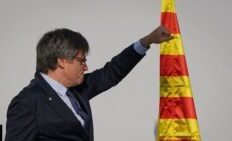BTN News: Barcelona was thrust back into the international spotlight as Carles Puigdemont, the former president of Catalonia and a fervent advocate for its independence, made a sensational return to Spain—only to disappear just as dramatically. The surprising sequence of events unfolded nearly seven years after Puigdemont fled the country in the wake of a failed bid for Catalan secession in 2017. With an arrest warrant still active against him, Puigdemont’s reappearance and subsequent flight have ignited fresh political tensions and placed the spotlight once more on the deep-rooted divisions within Spain over the issue of Catalan independence.
Puigdemont’s arrival in Barcelona was shrouded in secrecy until the very last moment. On the day he was expected to attend the inauguration of Catalonia’s new regional president, Puigdemont addressed thousands of supporters in a highly charged speech in the heart of the city. Standing before a sea of fervent followers, he denounced the Spanish government’s “relentless repression” of the Catalan independence movement and championed the right of the Catalan people to self-determination. His speech, delivered with characteristic defiance, was a bold statement in the face of the legal and political challenges that have surrounded him for years.
The former president’s appearance was not without drama. Following his speech, Puigdemont quickly disappeared from the public eye. According to eyewitnesses, he entered a tent adjacent to the stage, emerged shortly after, and sped away in a car that was allegedly provided by a regional police officer. This officer, now under arrest, is suspected of aiding Puigdemont in his latest escape. Despite the heavy police presence, which included traffic controls and checkpoints across Barcelona, Puigdemont managed to evade capture, leading to a significant manhunt throughout the city.
The incident has once again highlighted the strained relationship between Catalonia’s regional police force, the Mossos d’Esquadra, and the Spanish national authorities. During the 2017 referendum, the Mossos were criticized for their perceived leniency towards the vote, which had been declared illegal by the central government. Although the regional police force was later exonerated, the events of that period have left a lasting mark on their reputation and their relationship with Madrid.
Puigdemont’s return to Catalonia and his subsequent disappearance have also had significant political repercussions. His actions have reignited debates over the controversial law of amnesty, which has been a point of contention between the Spanish central government and the Catalan separatist movement. The law, introduced by the coalition government led by Socialist Prime Minister Pedro Sánchez, could potentially exonerate Puigdemont and other separatists involved in the 2017 referendum. However, the Spanish Supreme Court has challenged the application of this law, particularly concerning charges of embezzlement against Puigdemont.
The timing of Puigdemont’s reappearance is particularly noteworthy, as it coincides with the swearing-in of a new Catalan president. The political landscape in Catalonia remains deeply divided, with lingering bitterness between pro-independence factions and those opposed to secession. Salvador Illa, the leader of the Catalan Socialist Party (PSC), who is expected to assume the presidency, has called for reconciliation and adherence to the Spanish constitution. However, Puigdemont’s dramatic return has complicated these efforts, underscoring the persistent tensions that continue to plague Catalonia and Spain at large.
As the story of Puigdemont’s latest escape unfolds, it serves as a stark reminder of the ongoing struggle for Catalan independence—a movement that has deeply divided the region and challenged the unity of Spain. While the Spanish authorities have vowed to bring Puigdemont to justice, his ability to elude capture thus far has only added to his legend among supporters and critics alike. The political and legal implications of his actions will likely reverberate for years to come, as Spain continues to grapple with the unresolved question of Catalonia’s future.
Puigdemont’s return to Barcelona, albeit brief, has once again thrown the issue of Catalan independence into the national and international spotlight. His defiance in the face of legal repercussions, combined with his ability to evade capture, has both emboldened his supporters and infuriated his detractors. As Spain moves forward, the question remains: will Puigdemont’s actions reignite the push for Catalan independence, or will they further entrench the divisions that have already caused so much turmoil?
The story of Carles Puigdemont is far from over, and his latest chapter adds yet another layer of complexity to an already tumultuous political landscape. Whether viewed as a hero of the Catalan cause or a fugitive from justice, Puigdemont’s impact on Spanish politics is undeniable—and his influence, for better or worse, will continue to be felt in the years to come.


